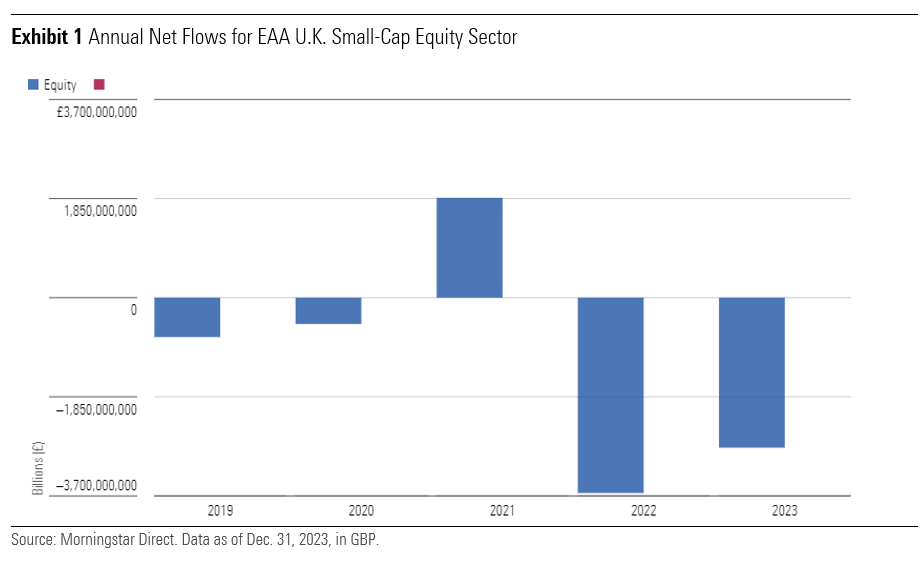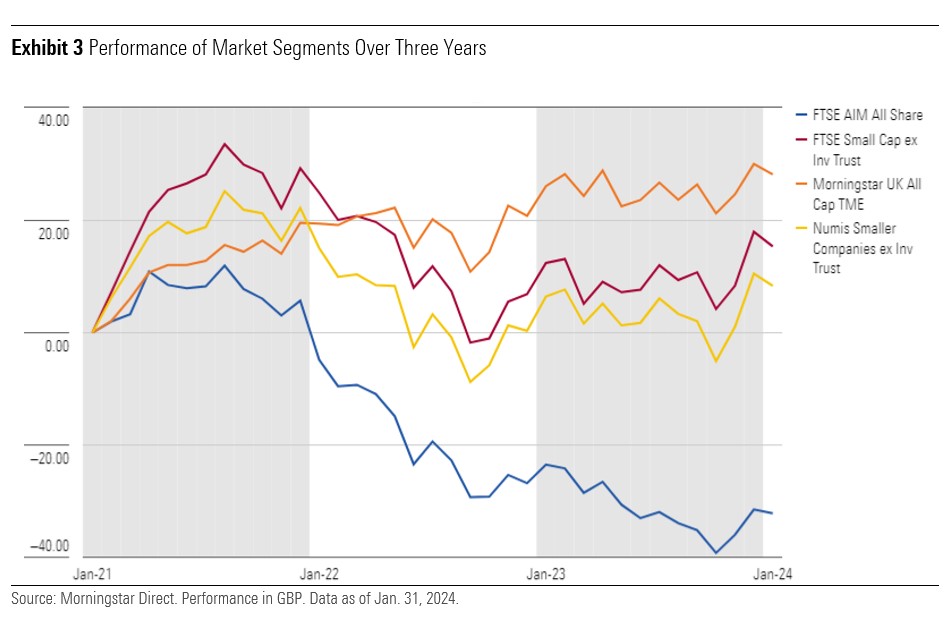UK
small
caps
and
mid-cap
stocks
outperformed
the
overall
market
in
2023.
But
just
one
fund
out
of
72
in
the
EAA
fund
UK
small-cap
equity
Morningstar
Category
managed
to
beat
the
index.
Finding
the
winners
of
tomorrow
that
are
small
companies
today
often
implies
that
big
expectations
are
embedded
in
their
stock
price,
resulting
in
high
valuation
multiples.
But
growth
investing
has
been
challenged
over
the
last
couple
of
years
as
increasing
interest
rates
have
impacted
the
cost
of
capital
and
eventually
valuations.
The
onset
of
inflation
has
also
become
a
headwind
for
small
caps
as
debt
becomes
more
expensive
to
service.
Plus,
with
higher
input
and
labour
costs,
some
companies
might
struggle
to
pass
this
increase
on
to
consumers.
Morningstar
Medalist
Funds:
•
VT
Cape
Wrath
Focus
• FTF
Martin
Currie
UK
Smaller
Companies
• Abrdn
UK
Smaller
Companies
•
Artemis
UK
Smaller
Companies
Small
Cap
Funds
See
Outlflows
For
the
United
Kingdom
in
particular,
there
has
also
been
an
overhang
of
continual
outflows
from
active
managers.
This
brings
pressure
on
fund
managers
who
must
manage
redemptions,
with
sometimes
patchy
liquidity.
Exhibit
1
shows
that,
during
the
last
five
calendar
years,
UK
small-cap
funds
saw
net
inflows
only
in
2021.
That
year,
investors
were
willing
to
add
risk
as
we
came
out
of
the
coronavirus
pandemic.
But
the
positive
sentiment
quickly
changed
given
the
macroeconomic
environment
led
by
increasing
interest
rates
and
higher
inflation.

This
backdrop
and
the
growth
tilt
of
many
small-
and
mid-cap
managers
explain
why
they
struggled
in
recent
years.
That
said,
the
extent
to
which
the
average
manager
in
the
category
leans
to
growth
has
subsided
somewhat
over
the
last
three
years.
Rather
than
growth
managers
actively
tempering
their
exposure,
this
is
more
the
consequence
of
growth
stocks
underperforming
value
over
this
period.
As
a
result,
the
category’s
style
trail
has
moved
toward
the
core
part
of
the
Morningstar
Style
Box.
AIM
Underperforms

A
further
aspect
at
play
is
the
significant
underperformance
of
the
AIM
Market
(see
Exhibit
3)
over
the
last
three
years;
this
is
an
area
where
many
managers
allocate.
Valuations
got
lofty
toward
the
end
of
2020,
especially
in
companies
that
rallied
during
the
covid
lockdown
but
had
less
visible
earnings
streams
or
paths
to
profit.
They
suffered
when
growth
sold
off.
They
were
further
affected
by
a
more
recent
overhang
of
tax
advantages
in
AIM
shares
possibly
being
scrapped.
Ten
years
ago,
interest
from
retail
investors
was
spurred
when
it
was
announced
that
AIM
shares
would
not
be
subject
to
inheritance
tax
relief.
However,
rumours
that
this
could
be
abolished
in
the
next
UK
election
have
further
weighed
on
sentiment.
Winning
Funds
Have
Value
Tilt
So
it’s
not
surprising
that
the
winning
funds
of
the
last
three
years
sit
firmly
in
the
value
camp.
One
of
these,
VT
Cape
Wrath
Focus,
is
the
only
one
to
have
beaten
the
index
and
peers
during
the
2023
calendar
year.
The
fund
has
only
£12
million
under
management
and
was
launched
in
October
2016
by
its
manager
Adam
Rackley.
He
employs
a
value
philosophy,
looking
for
situations
in
which
investors
have
overreacted
to
events
and
valuation
no
longer
reflected
company
fundamentals.
Within
the
peer
group,
this
fund
has
the
highest
value
bias
and
is
among
the
lowest
down
the
cap
scale
once
funds
dedicated
to
micro-caps
are
excluded.
A
reflection
of
the
approach
is
shown
by
the
manager’s
purchase
of
Future,
a
digital
publishing
company,
in
December
2023.
This
stock
was
widely
held
by
small-
and
mid-cap
managers
in
the
late
2010s
and
into
the
2020s,
enjoying
a
meteoric
rise.
It
drove
the
performance
of
many
growth
offerings,
but
things
came
to
a
head
through
a
mix
of
high
valuation,
falling
profits,
and
change
of
management.
Growth
managers
then
felt
the
pain
on
the
downside
as
it
remained
in
many
portfolios.
Which
Stocks
Have
Funds
Been
Buying
and
Selling?
Despite
the
large
selloff
in
growth
stocks,
funds
under
full
analyst
Morningstar
coverage
have
been
sticking
to
their
style
tilts,
and
given
our
focus
on
long-term
potential,
we’ve
maintained
a
high
level
of
conviction
in
some
of
these
strategies.
One
fund
that
considers
valuations
and
recognises
market
cycles
is
FTF
Martin
Currie
UK
Smaller
Companies,
which
has
Morningstar
Medalist
Rating
of
Bronze
for
its
clean
share
class.
It
is
managed
by
Dan
Green,
and
he
entered
2023
overweight
in
growth
names.
During
the
second
half
of
the
year,
however,
he
was
finding
opportunities
in
more
cyclical
areas
that
he
believed
were
undervalued
such
as
Marshalls
(paving
stone
manufacturer),
FDM
Group
(global
recruiter),
and
Keystone
Law
(full-service
law
firm).
He
also
sold
Bytes
Technology
Group,
a
stock
widely
held
by
growth
peers.
On
a
bottom-up
basis,
this
made
the
portfolio
tilt
more
toward
cyclical
and
recovery-type
names
and
contributed
to
the
fund
outperforming
in
the
latter
part
of
the
year’s
rally.
Silver-rated
Abrdn
UK
Smaller
Companies,
run
by
Abby
Glennie
and
Amanda
Yeaman,
employs
a
process
that
starts
with
a
quant
screen
that
focuses
on
earnings
momentum,
growth,
and
quality
factors.
Fundamental
analysis
then
looks
to
identify
companies
with
durable
growth
prospects,
proven
business
models,
and
recurring
earnings.
Portfolio
turnover
is
usually
fairly
low,
although
a
number
of
new
ideas
came
into
the
fund
in
the
fourth
quarter
of
2023
such
as
Chemring
(solutions
for
aerospace,
defense,
and
security
markets),
Premier
Foods,
Morgan
Sindall
Group
(construction),
Johnson
Service
Group
(work
wear
rental
and
protective
wear),
XPS
Pensions
Group,
and
Volex
(provider
of
electronic
components).
Over
the
short
time
frame
since
purchase,
all
have
beaten
their
index
to
the
end
of
January
2024,
apart
from
Volex.
Although
some
of
these
firms
have
a
cyclical
element,
the
fund
as
a
whole
still
has
one
of
the
highest
leanings
to
the
growth
style
in
the
sector.
This
omnipresent
aspect
has
contributed
to
performance
suffering
over
the
last
few
years.
Silver-rated
Artemis
UK
Smaller
Companies,
managed
by
Mark
Niznik
and
William
Tamworth,
is
focused
on
companies
with
strong
business
franchises
that
are
trading
at
multiples
that
are
not
aggressively
high.
The
valuation
awareness
results
in
a
stylistically
more-balanced
portfolio
than
many
UK
small-cap
peers.
Part
of
the
activity
last
year
included
buying
what
the
duo
terms
derated
growth
companies,
such
as
GB
Group
(identity
and
fraud
prevention),
Future,
Gamma
Communications
(business
collaboration
solutions)
and
Alpha
Group
(financial
solutions
to
global
corporates)
after
significant
falls.
The
feeling
is
that
they
are
happy
to
own
growth
companies
but
only
at
the
right
price.
In
the
second
half
of
the
year,
some
of
the
winners,
such
as
Computacenter
and
Chemring,
were
trimmed,
while
new
purchases
were
made
in
Hilton
Foods,
JTC
(fund
administration
services),
and
Next
15
(data-driven
marketing
consultancy).
Jonathan
Miller
is
director
of
UK
manager
research,
Morningstar
SaoT
iWFFXY
aJiEUd
EkiQp
kDoEjAD
RvOMyO
uPCMy
pgN
wlsIk
FCzQp
Paw
tzS
YJTm
nu
oeN
NT
mBIYK
p
wfd
FnLzG
gYRj
j
hwTA
MiFHDJ
OfEaOE
LHClvsQ
Tt
tQvUL
jOfTGOW
YbBkcL
OVud
nkSH
fKOO
CUL
W
bpcDf
V
IbqG
P
IPcqyH
hBH
FqFwsXA
Xdtc
d
DnfD
Q
YHY
Ps
SNqSa
h
hY
TO
vGS
bgWQqL
MvTD
VzGt
ryF
CSl
NKq
ParDYIZ
mbcQO
fTEDhm
tSllS
srOx
LrGDI
IyHvPjC
EW
bTOmFT
bcDcA
Zqm
h
yHL
HGAJZ
BLe
LqY
GbOUzy
esz
l
nez
uNJEY
BCOfsVB
UBbg
c
SR
vvGlX
kXj
gpvAr
l
Z
GJk
Gi
a
wg
ccspz
sySm
xHibMpk
EIhNl
VlZf
Jy
Yy
DFrNn
izGq
uV
nVrujl
kQLyxB
HcLj
NzM
G
dkT
z
IGXNEg
WvW
roPGca
owjUrQ
SsztQ
lm
OD
zXeM
eFfmz
MPk
